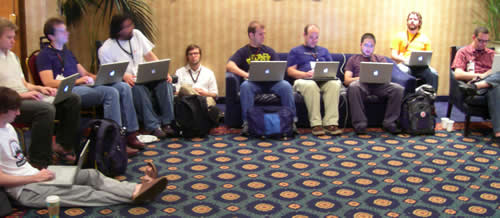
Me playing at the Lucky Labrador last night.
Looking for pictures of RailsConf? Check out the Flickr tags RailsConf and RailsConf2007.

Me playing at the Lucky Labrador last night.
Looking for pictures of RailsConf? Check out the Flickr tags RailsConf and RailsConf2007.
The third installment of the RailsEnvy guys’ series of “I’m a Mac”-style ads (see this earlier article for more) features Rails vs. PHP once again, this time on file organization:
The “a place for everything and everything in its place” file layout of Rails is a wonderful thing, and something Adam Keys made very clear in his presentation at last year’s RailsConf.
For those of you who are wondering what to do before or after RailsConf or between sessions, here are some suggestions:
Over at the Planet Argon Blog, there’s a series of articles called Portland Revealed that visitors should read:
James Duncan Davidson wrote a little piece on how to get from the airport to downtown Portland cheaply — by taking the MAX, the light rail system. It’s only fitting that you travel to RailsConf by rail!
You can also find out what’s happening online in a few places:
Since there’s considerable overlap between the Cult of Mac and the Cult of Rails, it was inevitable some Rails enthusiasts would make Rails advocacy videos borrowing from the style of the popular “I’m a Mac / I’m a PC” ads.
Gregg Pollack and Jason Seifer of the blog Rails Envy are posting a series of Rails-themed “I’m a Mac”-style videos, one each day leading up to RailsConf, in order to get everyone fired up for the conference.
Here’s yesterday’s ad, in which Java plays the “PC” role:
Here’s today’s ad, in which PHP — who bears a strange resemblance to Java — is the PC:
One of the first things I noticed at last year’s RailsConf conference was that Mac laptops far outnumbered PC laptops. Outside of Apple’s Worldwide Developer Conference (and possible FOO and BarCamp), you normally don’t see this sort of Mac-PC ratio.
I took the snapshot below last year. It of a group of attendees hanging out between sessions. Note that every laptop in the shot, including that of conference organizer Chad Fowler (4th from left) and presenter Adam Keys (5th from right) — is a Mac:

Here’s a closer look — a video of a sea of Macs on developers’ laps:

While most Rails projects are eventually deployed as production apps on Linux-based servers, OS X is the preferred development environment for Rails geeks. That’s no surprise, considering that Rails creator/figurehead/supermodel David Heinemeier Hansson is himself a Mac guy, as he writes in this article on his blog, Loud Thinking:
Paul Graham is writing about the Mac adoption amongst hackers in general and his own return in particular:
“All the best hackers I know are gradually switching to Macs… The reason, of course, is OS X. Powerbooks are beautifully designed and run FreeBSD. What more do you need to know? I got a Powerbook at the end of last year. When my IBM Thinkpad’s hard disk died soon after, it became my only laptop.”
It’s great to see that over the past few years it has become the norm, not the exception, that good programmers are wielding Macs. There’s the odd exception of Linux here and there, but the writing’s on the wall: OS X offers the best personal computing experience available today.
While I can certainly understand the reasons why some people go with Linux, I have run all but dry of understanding for programmers that willfully pick Windows as their platform of choice. I know a few that are still stuck in the rut for various reasons — none of them desire.
I would have a hard time imagining hiring a programmer who was still on Windows for 37signals. If you don’t care enough about your tools to get the best, your burden of proof just got a lot heavier.
It’s another interesting chapter in the rise of the Mac among the not-quite-mainstream programmer crowd, a trend that first became apparent during the first O’Reilly Emerging Technology Conference back in 2002. All through RailsConf 2006, I was reminded of Tim O’Reilly’s remarks in his 2002 WWDC keynote, Watching the “Alpha Geeks”: OS X and the Next Big Thing.
Seeing they were in the minority, RailsConf 2006 attendee Christian Metts handed out “Certificates of Nonconformity” to people sporting non-Macintosh laptops and took their photos. These RailsConf nonconformists were also photographed for posterity, and the photos have been collected in this Flickr set.
The most famous of the nonconformists was none other than the enigmatic Rubyist known only as why the lucky stiff, who posed in classic “why” fashion with his certificate:
Okay, so the just-announced new MacBook line doesn’t have the OLED displays that Jobs mentioned Apple would have sometime this year, or the Santa Rosa chipset. You still get a lot of bang for the buck, which includes:
Apple does list the specs in their news release, but I’ve rearranged them into a nice matrix to make comparison shopping easier for you. You can’t say we at Global Nerdy ain’t never done nuthin’ for ya!
| System | 2.0 GHz 13″ White MacBook | 2.16 GHz 13″ White MacBook | 2.16 GHz 13″ Black MacBook |
| Price | US$1,099 | US$1,299 | US$1,499 |
| Display | 13.3-inch glossy widescreen 1280 x 800 display | ||
| Processor | 2.0 GHz Intel Core 2 Duo processor | 2.16 GHz Intel Core 2 Duo processor | |
| Bus | 667 MHz front-side bus | ||
| RAM | 1GB of 667 MHz DDR2 SDRAM, expandable to 2GB | ||
| Hard Drive | 80GB Serial ATA hard drive running at 5400 rpm, with Sudden Motion Sensor | 120GB Serial ATA hard drive running at 5400 rpm, with Sudden Motion Sensor | 160GB Serial ATA hard drive running at 5400 rpm, with Sudden Motion Sensor |
| Optical Drive | Slot-load Combo (DVD-ROM/CD-RW) optical drive | Slot-load 8x SuperDrive with double-layer support (DVD+R DL/DVD+RW/DVD-RW/CD-RW) optical drive | |
| Graphics System | Intel Graphics Media Accelerator 950 | ||
| Video Out | Mini-DVI out (adapters for DVI, VGA and Composite/S-Video sold separately) | ||
| Video In | Built-in iSight video camera | ||
| Wired Networking | Gigabit Ethernet port / 2 USB 2.0 ports / FireWire 400 port | ||
| Wireless Networking | Built-in AirPort Extreme 802.11n wireless networking / Bluetooth 2.0+EDR | ||
| Audio In/Out | One audio line in and one audio line out port, each supporting both optical digital and analog | ||
| Input Devices | Scrolling TrackPad / Apple Remote | ||
| Power Adapter | 60 Watt MagSafe Power Adapter | ||
More evidence that those rumors about Apple updating their line of consumer-level laptops today are true: as of this writing (Tuesday, May 15th, 8:35 a.m. EDT) online Apple stores worldwide are displaying a banner that reads “We are busy updating the store for you and will be back shortly”, shown below:

Here’s what Think Secret speculates the updates to the MacBook line may be: